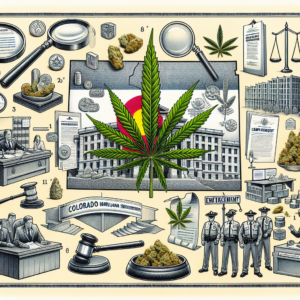Contents
Introduction to Delta-9 THC
Delta-9 Tetrahydrocannabinol (THC) is a naturally occurring compound found in cannabis plants. It is one of the primary cannabinoids responsible for the psychoactive effects commonly associated with cannabis consumption. In recent years, Delta-9 THC has garnered increasing attention and popularity, not only within the recreational cannabis market but also in the realm of medical research and therapeutic applications.
While Delta-9 THC remains federally classified as a Schedule I controlled substance in the United States, several states have implemented their own laws and regulations regarding its cultivation, distribution, and use. This patchwork of state-level legislation has led to varying legal frameworks and interpretations concerning the legality of Delta-9 THC products.
Moreover, the emergence of Delta-8 THC, a structural analog of Delta-9 THC with similar psychoactive properties, has introduced further complexities to the regulatory landscape. The legal status of Delta-8 THC and its distinction from Delta-9 THC vary from state to state, adding layers of nuance to the discussion surrounding cannabis and cannabinoid regulation.
Against this backdrop, it is crucial to examine the legal status, legislative developments, enforcement mechanisms, consumer access, industry perspectives, public perception, and potential future changes pertaining to Delta-9 THC in specific jurisdictions. This comprehensive analysis will provide insight into the evolving regulatory environment surrounding cannabis and cannabinoids, with a focus on Vermont as a case study.
State-specific Legal Framework
In Vermont, the legal landscape surrounding cannabis and cannabinoids has undergone significant evolution in recent years. The state has taken progressive steps towards cannabis legalization, starting with the decriminalization of small amounts of marijuana in 2013 and culminating in the establishment of a regulated adult-use cannabis market in 2021.
Under Vermont law, cannabis is defined as including “all parts of the plant Cannabis sativa L., whether growing or not, the seeds thereof, and every compound, manufacture, salt, derivative, mixture, or preparation of the plant or its seeds,” encompassing both Delta-9 THC and other cannabinoids.
While Vermont allows for the cultivation, sale, and possession of cannabis for adult recreational use, the state imposes strict regulations on the THC content of cannabis products. Products containing Delta-9 THC above a certain threshold are subject to additional scrutiny and may be subject to different legal classifications.
However, the legal status and regulatory framework specifically pertaining to Delta-9 THC products within Vermont’s cannabis market remain subject to interpretation and ongoing legislative and administrative developments. As such, it is essential for stakeholders to stay informed about the latest laws and regulations governing Delta-9 THC in the state.
Recent Legislative Developments
Recent legislative actions and regulatory changes in Vermont have had significant implications for the legality and regulation of Delta-9 THC products. One notable development is the passage of Act 164 in 2021, which established the framework for a regulated adult-use cannabis market in the state. This legislation marked a milestone in Vermont’s approach to cannabis policy, providing for the licensing of cultivators, retailers, and other cannabis-related businesses.
Furthermore, Act 164 included provisions for the regulation of THC potency in cannabis products, including specific limits on the amount of Delta-9 THC allowed in various product categories. These potency regulations aim to ensure consumer safety and mitigate the potential risks associated with high-potency cannabis products.
Additionally, ongoing legislative and regulatory discussions have focused on refining the parameters of Vermont’s cannabis market, addressing issues such as licensing requirements, taxation, and social equity considerations. These discussions may have implications for the legal status and regulation of Delta-9 THC products, as policymakers seek to balance public health and safety with the demands of a burgeoning cannabis industry.
Overall, recent legislative developments in Vermont underscore the dynamic nature of cannabis policy and the need for stakeholders to remain vigilant and engaged in the regulatory process. As the legal landscape continues to evolve, it is essential for individuals and businesses involved in the production, distribution, and consumption of Delta-9 THC products to stay informed about changes that may affect their operations and compliance obligations.
Enforcement and Compliance
Enforcement agencies in Vermont are tasked with interpreting and enforcing laws and regulations related to Delta-9 THC. These agencies, including the Vermont State Police and the Department of Public Safety, play a crucial role in ensuring compliance with cannabis regulations and addressing instances of non-compliance.
Given the evolving nature of cannabis policy in Vermont, enforcement agencies may face challenges in interpreting and enforcing Delta-9 THC laws consistently. The distinction between legal and illegal cannabis products, particularly those containing Delta-9 THC, may require careful consideration and expertise.
Penalties for non-compliance with Delta-9 THC regulations in Vermont vary depending on the nature and severity of the violation. Individuals and businesses found to be in violation of cannabis laws may face fines, civil penalties, or even criminal charges, depending on the circumstances.
To navigate the complex landscape of Delta-9 THC regulation and ensure compliance with state laws, stakeholders should prioritize education and awareness. By staying informed about the latest regulations and working proactively to adhere to compliance requirements, individuals and businesses can mitigate the risk of enforcement actions and maintain the integrity of Vermont’s cannabis market.
Consumer Access and Availability
The availability of Delta-9 THC products in Vermont is influenced by the state’s legal framework governing cannabis and cannabinoids. With the establishment of a regulated adult-use cannabis market under Act 164, consumers have gained legal access to a variety of cannabis products, including those containing Delta-9 THC.
Consumers can legally purchase Delta-9 THC products from licensed cannabis retailers operating in compliance with Vermont law. These retailers are subject to stringent regulations concerning product testing, labeling, and packaging to ensure consumer safety and product quality.
However, certain restrictions may apply to the sale and distribution of Delta-9 THC products, particularly regarding potency limits and age restrictions. Retailers must adhere to these regulations to maintain their licensing status and avoid potential enforcement actions.
Overall, the availability of Delta-9 THC products in Vermont reflects the state’s evolving approach to cannabis regulation and consumer access. As the legal landscape continues to develop, consumers can expect to see an expanding range of cannabis products on the market, accompanied by robust regulatory oversight to protect public health and safety.
Industry Perspectives
Industry stakeholders, including Delta-9 THC producers, retailers, and advocacy groups, offer valuable insights into the legal landscape surrounding cannabis in Vermont. Producers and retailers navigate the regulatory framework to ensure compliance while meeting consumer demand for Delta-9 THC products.
Advocacy groups play a crucial role in shaping cannabis policy and promoting industry interests. They advocate for equitable regulations that support small businesses, promote social equity, and prioritize consumer safety.
However, industry stakeholders also face challenges, including navigating complex regulations, ensuring product consistency and quality, and accessing banking services. Additionally, evolving market dynamics and competition contribute to a dynamic business environment.
Despite these challenges, the industry continues to grow and adapt, driven by consumer demand and regulatory changes. Industry stakeholders remain actively engaged in legislative and regulatory discussions, advocating for policies that foster a thriving and responsible cannabis market in Vermont.
Public Perception and Awareness
Public opinion regarding Delta-9 THC in Vermont is influenced by a variety of factors, including cultural attitudes, media coverage, and personal experiences. While cannabis legalization enjoys widespread support in the state, opinions may vary concerning the use and regulation of Delta-9 THC products.
Media coverage and public discourse surrounding Delta-9 THC play a significant role in shaping public perception. Positive portrayals of cannabis as a medical treatment or recreational substance may contribute to increased acceptance, while negative portrayals may perpetuate stigmas and misconceptions.
Furthermore, education and awareness efforts play a crucial role in informing the public about the potential risks and benefits of Delta-9 THC use. Outreach initiatives, community forums, and educational campaigns aim to empower individuals to make informed decisions about cannabis consumption and advocate for responsible use.
Overall, public perception of Delta-9 THC in Vermont reflects a complex interplay of social, cultural, and political factors. As attitudes continue to evolve and awareness grows, it is essential to foster open dialogue and promote evidence-based education to support informed decision-making and mitigate potential harms.
Potential Future Changes
Speculating on potential future changes to Delta-9 THC laws and regulations in Vermont requires considering various factors that may influence legislative or regulatory decisions. One significant factor is the evolving landscape of cannabis policy at the federal level, including potential changes to federal cannabis laws and regulations.
Additionally, shifts in public opinion and societal attitudes towards cannabis and cannabinoids may influence policymakers’ decisions regarding Delta-9 THC regulation. As public awareness and acceptance of cannabis use continue to grow, there may be increasing pressure to further liberalize cannabis laws in Vermont.
Moreover, industry trends and market dynamics may drive changes in Delta-9 THC regulations. The emergence of new products, advances in technology, and evolving consumer preferences may necessitate updates to existing regulations to ensure consumer safety and market integrity.
Furthermore, considerations of social equity, public health, and economic impact are likely to shape future legislative and regulatory decisions concerning Delta-9 THC in Vermont. Policymakers will need to balance competing interests and objectives to develop a regulatory framework that promotes responsible cannabis use while addressing societal concerns.
Overall, the future outlook for Delta-9 THC regulation in Vermont is subject to a range of factors and uncertainties. However, stakeholders can expect ongoing discussions and debates surrounding cannabis policy as the state continues to navigate the complexities of cannabis legalization and regulation.
Legal Considerations for Consumers
For consumers in Vermont, understanding and navigating the legal landscape surrounding Delta-9 THC is essential to ensure compliance with state laws and regulations. Here are some key considerations:
1. **Purchase from Licensed Retailers:** Consumers should only purchase Delta-9 THC products from licensed cannabis retailers operating legally in Vermont. These retailers are subject to regulatory oversight and must adhere to strict compliance requirements.
2. **Check Product Labels:** Consumers should carefully review product labels to ensure compliance with potency limits and other regulatory requirements. Products containing excessive levels of Delta-9 THC may be subject to legal restrictions or enforcement actions.
3. **Age Restrictions:** Individuals must be of legal age to purchase and possess Delta-9 THC products in Vermont. Retailers are required to verify the age of customers and may refuse sales to minors.
4. **Consume Responsibly:** Consumers should exercise caution and moderation when consuming Delta-9 THC products. It is essential to understand the effects of cannabis and to avoid driving or operating heavy machinery while under the influence.
5. **Stay Informed:** As laws and regulations concerning Delta-9 THC may change over time, consumers should stay informed about the latest developments and updates from regulatory authorities. This may include changes to potency limits, licensing requirements, or retail restrictions.
By staying informed and adhering to legal requirements, consumers can ensure a safe and compliant experience when purchasing and using Delta-9 THC products in Vermont.
Conclusion
In conclusion, the legal landscape surrounding Delta-9 THC in Vermont is characterized by a dynamic interplay of legislative, regulatory, and societal factors. With the establishment of a regulated adult-use cannabis market and ongoing discussions surrounding cannabis policy, Vermont continues to navigate the complexities of cannabis legalization and regulation.
Consumers, industry stakeholders, and policymakers alike must remain vigilant and engaged in the ongoing dialogue surrounding Delta-9 THC regulation. By staying informed about the latest laws and regulations, advocating for responsible cannabis use, and promoting evidence-based education, stakeholders can contribute to the development of a robust and equitable regulatory framework.
Looking ahead, the future outlook for Delta-9 THC regulation in Vermont remains subject to various factors, including federal cannabis policy, shifting public attitudes, and market dynamics. As the legal landscape continues to evolve, stakeholders can expect ongoing discussions and debates surrounding cannabis policy in Vermont.
Ultimately, the goal of Delta-9 THC regulation in Vermont is to promote public health and safety while addressing the diverse needs and interests of consumers, industry participants, and the broader community.


